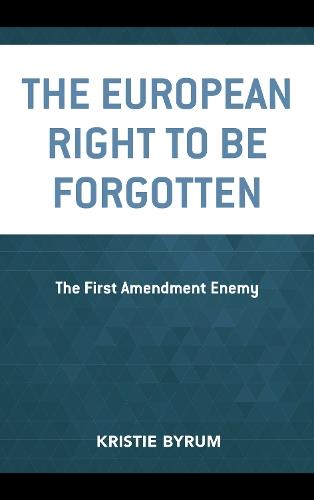Overview
The European Right to be Forgotten: The First Amendment Enemy asserts that the right to be forgotten provision of the European General Data Protection Regulation threatens the free flow of information within a global society. In a thoughtful explanation of how the regulation functions as an enemy of the United States’ First Amendment, the book addresses the marketplace of ideas, communication in democracy, the specter of government intervention, censorship, and the distortion of history in the Right to be Forgotten environment. While RTBF advocates point to the regulation as a privacy victory, the author explains how the erasure of data from search engine results foretells negative consequences for social, political, and economic environments. In a rallying cry to preserve freedom of information in the technology driven era, the author presents “The Free Speech Manifesto for the Digital Age: Seven Tenets to Preserve Information Flow in Democracy.” This book offers a unique communications-based perspective on the Right to be Forgotten and precisely documents why a corresponding regulation in the United States conflicts with constitutional protections.
Full Product Details
Author: Kristie Byrum
Publisher: Lexington Books
Imprint: Lexington Books
Dimensions:
Width: 15.30cm
, Height: 1.50cm
, Length: 23.10cm
Weight: 0.313kg
ISBN: 9781498549622
ISBN 10: 1498549624
Pages: 204
Publication Date: 19 April 2021
Audience:
Professional and scholarly
,
Professional & Vocational
Format: Paperback
Publisher's Status: Active
Availability: Manufactured on demand

We will order this item for you from a manufactured on demand supplier.
Reviews
A thoughtful exploration of the powerful tensions between Europe's recognition of a Right to be Forgotten and American conceptions of free speech and press, demonstrating how one culture's protection of privacy may be another culture's censorship. -- Rodney Smolla, Delaware Law School This book explores a complicated question-how should our government balance freedom of information with an individual's right to privacy? If the US were to adopt a right to be forgotten, would erased facts become fake news? Would real fake news become more difficult to discredit? While acknowledging the importance of an individual's right to privacy, Dr. Byrum explores the history and principles underlying the First Amendment and argues persuasively that the fundamental freedoms and protection from government intervention found in the Bill of Rights remain strong enough to combat search engine manipulation and that the European Right to be Forgotten would damage these freedoms. She advocates for the free flow of information, arguing that the Right to be Forgotten will deprive the marketplace of ideas, creating Orwellian memory holes and threatening the collective cultural and historical memory of specific events, including protests and political actions. -- Neil E. Grayson, Nelson Mullins
Author Information
Kristie Byrum is assistant professor of mass communications at Bloomsburg University of Pennsylvania.




